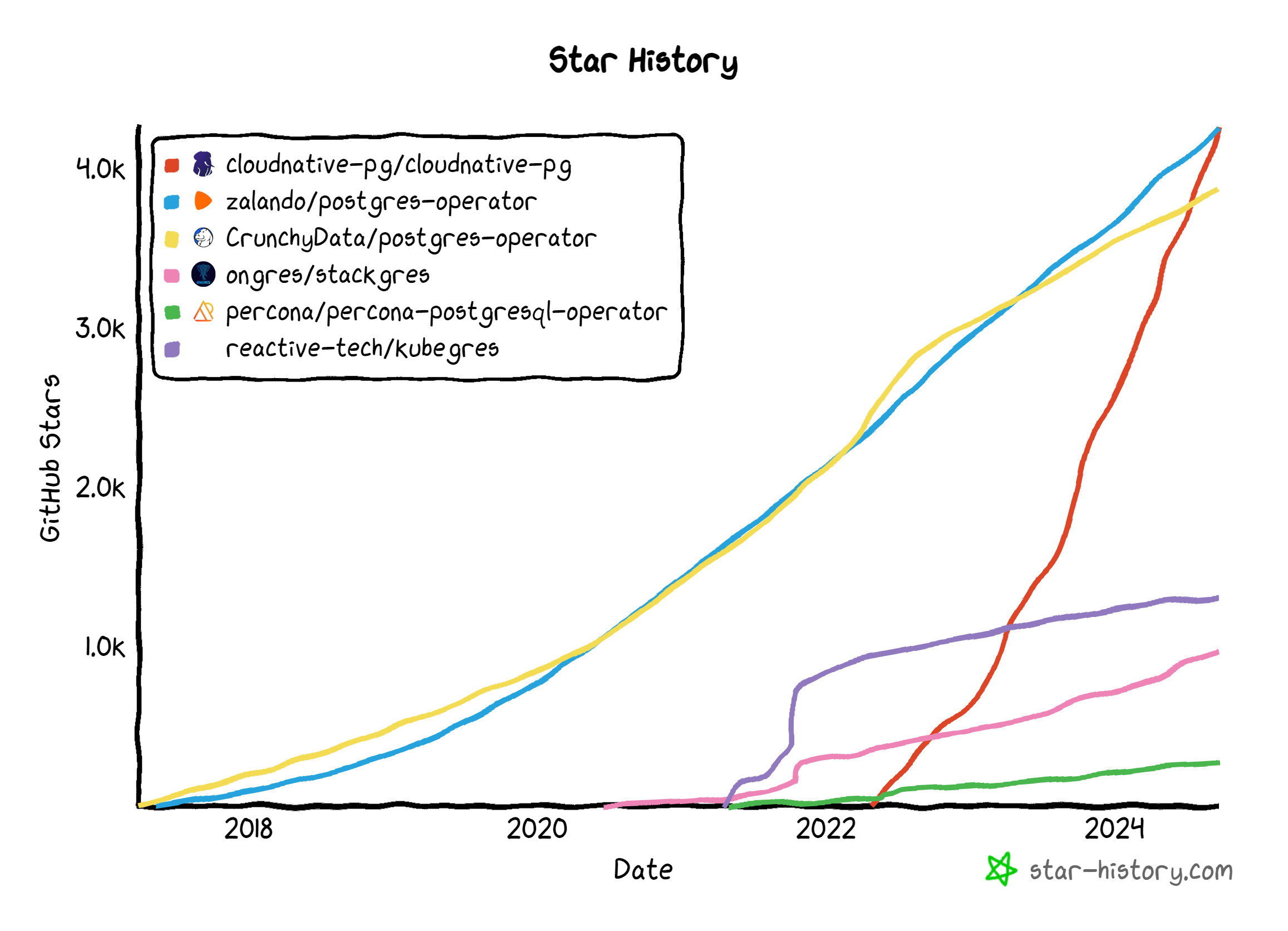In just two years since its open source launch, CloudNativePG—EDB’s Kubernetes operator for Postgres—has climbed past early leaders like Zalando and CrunchyData, racking up more than 5,000 stars on GitHub to become the world’s most popular PostgreSQL operator.
It’s been a meteoric rise driven by a dedicated community and some bold decisions along the way, and we’re proud to add this latest achievement to CloudNativePG’s growing list of milestones.
So, how did we get here?
The Rise of CloudNativePG
CloudNativePG was born out of the need for a PostgreSQL solution designed specifically for Kubernetes. When we started the project in 2019 (at that time in 2ndQuadrant), industry leaders like Zalando and CrunchyData had already made significant strides in this space; in fact, it was the demonstration of Zalando’s failover implementation by Oleksii Kliukin in 2018 that inspired us to think differently about solving the problem of managing Postgres in Kubernetes. At the same time, our team’s strong DevOps culture aligned perfectly with the core principles of Kubernetes: automation, scalability, and resilience.
With those values guiding us, we set out to build an operator that was lightweight, fully declarative, and tightly aligned with Kubernetes' native APIs—unlike existing solutions that often required external tools for key functionalities. The breakthrough came in 2020 when we integrated PostgreSQL’s native failover capabilities directly into Kubernetes workflows, radically simplifying cluster management in cloud-native environments. This shift laid the foundation for production readiness in 2021, at which point CloudNativePG quickly garnered attention from the Kubernetes community.
In May 2022, we transitioned CloudNativePG into an open source project under the Apache License 2.0, reinforcing our commitment to a vendor-neutral, community-driven initiative. This shift laid the groundwork for our pursuit of graduation within the Cloud Native Computing Foundation (CNCF). While our first attempt to enter the CNCF Sandbox–the first stages toward final graduation–didn’t move forward as planned, we’ve made significant progress since then and are currently preparing for a second submission ahead of KubeCon North America 2024.
It was only a few months ago that we were celebrating 3,000 GitHub stars, and here we are today:

Why CloudNativePG?
There’s plenty of reasons for this explosive growth.
CloudNativePG isn’t just another database operator. It was architected from the ground up to thrive within Kubernetes, purpose-built to eliminate the friction that often comes with managing databases in a containerized environment. The core innovation: integrating PostgreSQL’s native capabilities—like cluster management, continuous backup, point-in-time recovery (PITR), and high availability—directly into Kubernetes workflows.
Unlike many operators that rely on external tools for failover and replication, CloudNativePG extends the Kubernetes controller to directly leverage PostgreSQL’s native streaming replication, allowing for easy cluster management and maintaining performance during disruptions. This also enables database replication across Kubernetes clusters, making it ideal for disaster recovery and distributed setups.
As an added layer, CloudNativePG enhances the Kubernetes experience with built-in support for observability (via Prometheus), security (TLS and mutual authentication), and smooth rolling updates, simplifying database management.
By being open source, CloudNativePG reduces vendor lock-in and gives organizations the flexibility to choose their infrastructure—whether on-premises, cloud, or hybrid. This versatility has made it a go-to for those looking to future-proof their database strategies. Alongside this, EDB is always here to provide enterprise-grade support on the Kuberenetes, PostgreSQL, and CloudNativePG stack to help organizations all over the world maximize the potential of these technologies.
Our deep involvement in the Data on Kubernetes (DoK) Community and the CNCF has been key to advancing CloudNativePG. As the first Postgres company to become a Kubernetes Certified Service Provider (KCSP), EDB has continued to push the boundaries of what’s possible for Postgres in cloud-native environments. By embracing Kubernetes-native design patterns, CloudNativePG is part of a broader movement reshaping how databases integrate with cloud-native architectures.
What’s Next for CloudNativePG?
Surpassing 5,000 GitHub stars is amazing, but it’s only the beginning.
CloudNativePG’s trajectory is fueled by a passionate and growing community of developers and organizations contributing to its evolution. With the increasing adoption of microservices, Kubernetes, and DevOps practices, the demand for efficient, scalable, and secure database management will continue to rise.
CloudNativePG is positioned to lead the charge, ensuring that Postgres remains at the heart of modern, cloud-native applications. Whether you're deploying in a single cloud, multi-cloud, or hybrid environment, CloudNativePG offers a flexible, future-ready solution that empowers organizations to focus on innovation, not infrastructure.
Gabriele Bartolini, VP Chief Architect of Kubernetes at EDB, sums it up best: "Reaching this milestone is a testament to the power of open-source collaboration and the incredible work of our community. CloudNativePG has not only redefined how organizations manage Postgres in Kubernetes, but it has also shown what’s possible when we combine the best of Kubernetes with the reliability and flexibility of PostgreSQL. This is just the start—we’re committed to continuing this journey and unlocking even more potential for cloud-native databases.
Want to see how CloudNativePG can transform your database strategy? Head over to our crash course.
EDB is also offering a one-day training session at PGConf.EU 2024 in Athens on October 22, where you can dive deeper into mastering PostgreSQL in Kubernetes with CloudNativePG. Learn more about the session here.
